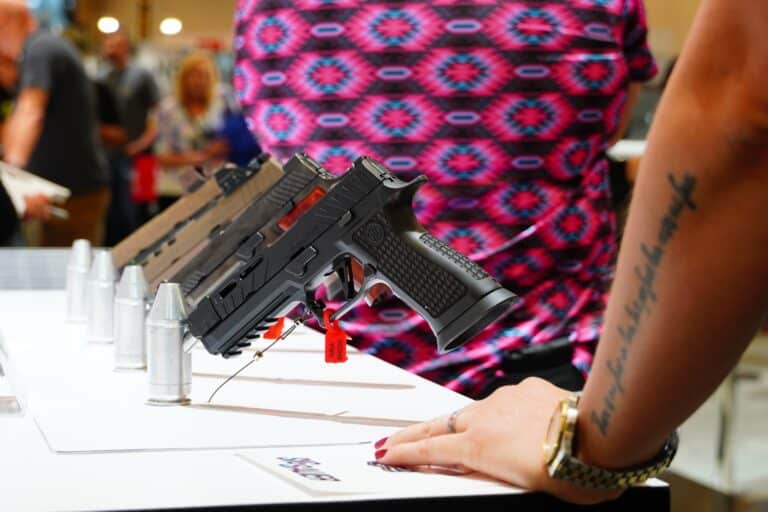The company overseeing some of the world’s largest social media platforms just vowed to stop cracking down on controversial and politically tinged content. Gun enthusiasts will have to wait and see how that affects them.
Meta, the parent company of Facebook, Instagram, Whatsapp, and Threads, unveiled a series of sweeping changes to its content moderation practices Tuesday in what its founder, Mark Zuckerberg, said is a bid to “get back to its roots around free expression.” The company announced an end to its third party fact-checking program and a plan to reduce speech restrictions on contentious political topics “like immigration, gender identity, and gender.” Left unmentioned in the announcement, however, was how lawful firearms content would be impacted.
The “Weapons, Ammunition, and Explosives” commerce policy page on Meta’s website remains largely unchanged, even though significant revisions have already been posted to the company’s “hateful conduct” page, removing examples of prohibited discussions of gender identity and sexual orientation. Meta also did not respond to The Reload‘s requests for comment on the omission or answer questions on how firearms-related content will be treated under the new moderation regime.
Meta’s about-face on rigorous content moderation and fact-checking comes after years of criticism from conservatives who felt the company’s platforms were overly censorious and politically biased against them. It suggests the company is responding to a shift in the country’s political winds as one of its loudest critics, Donald Trump, gets set to retake the White House. At the same time, the company’s silence on its treatment of firearms content comes despite gun businesses and content creators being frequent targets of Meta’s prior moderation regime, which they have claimed unfairly restricted and suspended their accounts despite their best efforts to comply.
Meta’s current community standards prohibit its users from posting attempts to “buy, sell, or trade, firearms, firearm parts, ammunition, explosives, or lethal enhancements” unless they’re posts by a “Page, Group or Instagram profile representing legitimate brick-and-mortar entities” like federally licensed gun dealers or government agencies. The company also states that “educational material promoting weapon safety, training, and licensing” is allowed on its platforms.
However, accounts that seemingly fall into these allowances have often found themselves in the company’s content moderation crosshairs.
Last November, the Facebook page for American firearm giant Smith and Wesson was indefinitely suspended for posts flagged as violating the company’s weapons policy. Meta later restored the gun company’s page and claimed its removal was done in error, but only after a post announcing the suspension went viral, and The Reload reached out to the company for comment on the suspension.
Last July, a board member of USA Shooting took to the pages of the Wall Street Journal to tell the story of McKenna Geer, an American paralympic shooter whose account was “shadow banned” on Instagram after Meta flagged a post she shared of her air rifle for violating its guidelines. Gun-rights organizations and industry groups, including the Second Amendment Foundation and the National Shooting Sports Foundation, as well as conservative outlets like Fox News, have all documented similar sanctions against ostensibly compliant accounts run by small FFLs, concealed carry instructors, and competitive shooters.
At the same time, many gun-control advocates have argued the company hasn’t done enough to enforce its firearms content policies. Everytown for Gun Safety partnered with the Tech Transparency Project to conduct an investigative report last October that documented more than 230 posts selling guns or even illegal accessories, such as machinegun switches, on Meta’s platforms. The group called for Meta to implement further crackdowns, including “improved enforcement of existing guidelines” and “a significantly lowered threshold for banning users” alleged to have violated the company’s weapons rules.
Despite firearms being left out of the company’s announced topical priorities, gun accounts may still benefit from some of the announced changes to Meta’s enforcement approach. In a post outlining the policy changes, Joel Kaplan, Meta’s chief global affairs officer, acknowledged that the company’s automated systems for flagging content violations “resulted in too many mistakes” and claimed it was responsible for “the vast majority of the censorship” on Meta platforms. As a result, he said the company would be paring back its reliance on these automated tools.
“We’re going to continue to focus these systems on tackling illegal and high-severity violations, like terrorism, child sexual exploitation, drugs, fraud and scams,” Kaplan wrote. “For less severe policy violations, we’re going to rely on someone reporting an issue before we take any action.”
He also announced that the company would invest in improving the appeals process for users challenging an enforcement action.
“We’ve added extra staff to this work and in more cases, we are also now requiring multiple reviewers to reach a determination in order to take something down,” he wrote.




